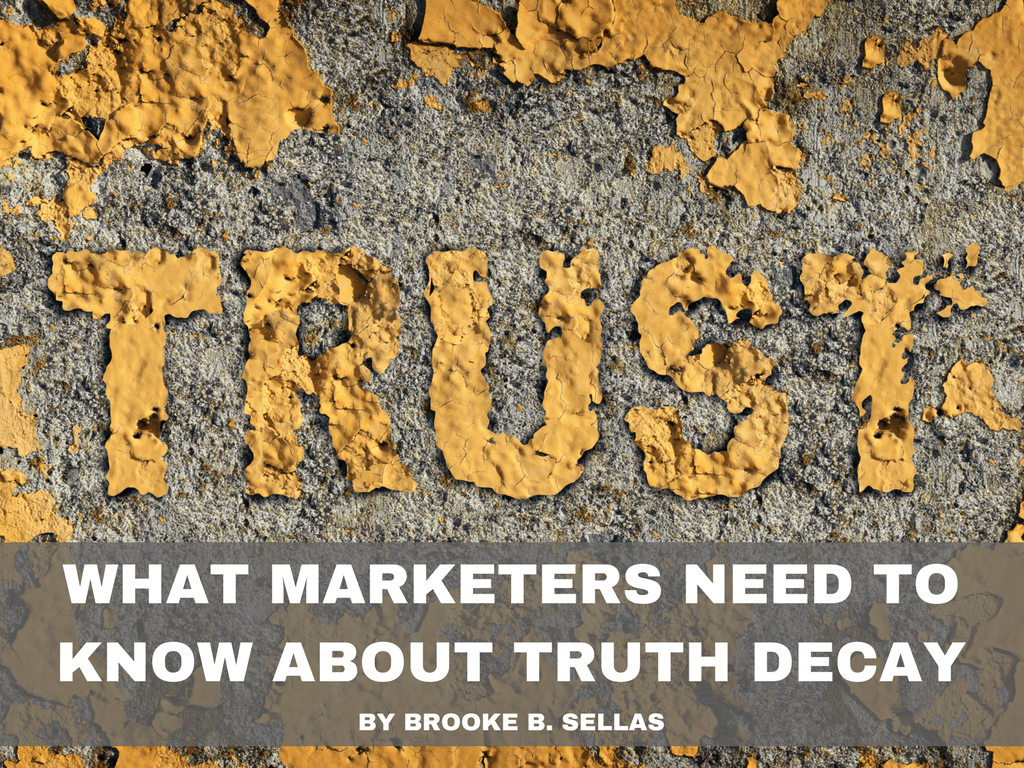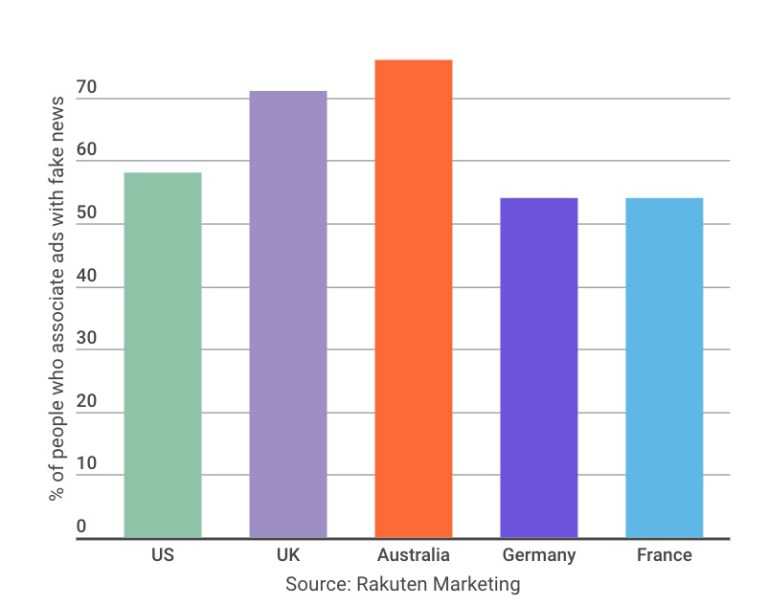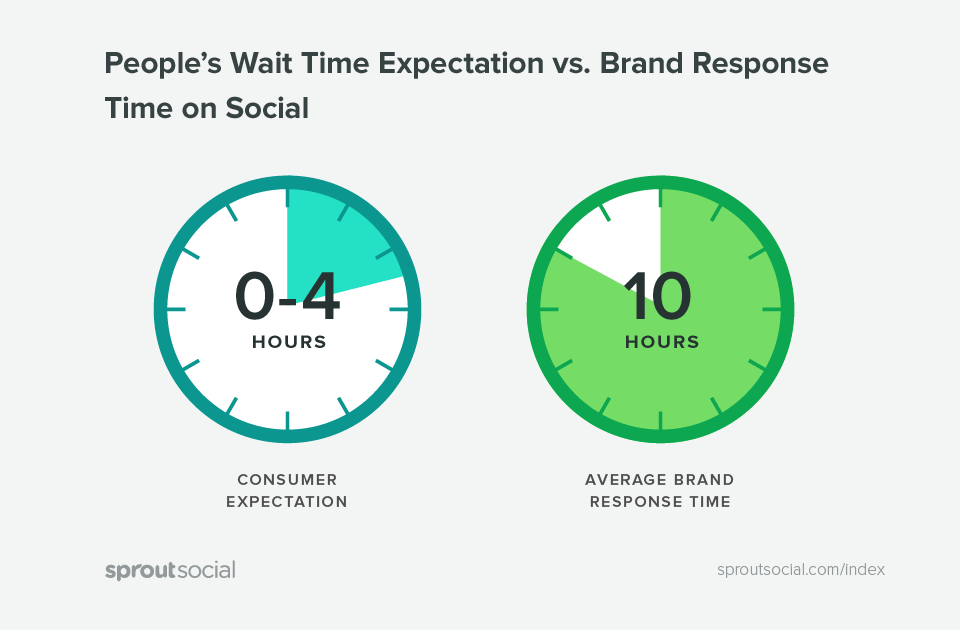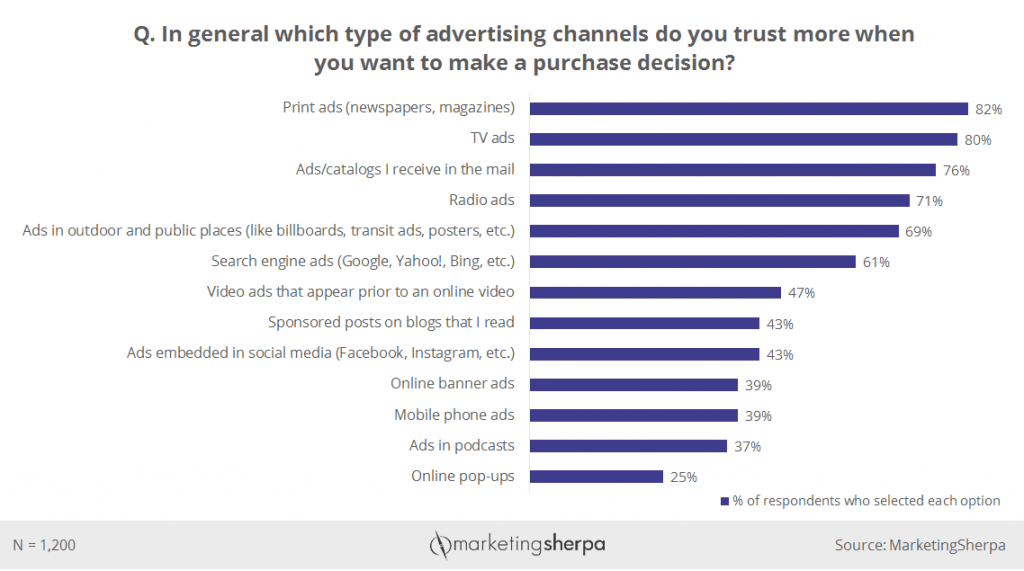
By Brooke B. Sellas, {grow} Contributing Columnist
Truth decay is all around us.
As we increasingly become inclined to disregard facts, data, and analysis, we base our decisions and outcomes on opinions.
Someone in PR may call this “spin” but it’s truly something marketers need to be wary of.
Here’s what truth decay means for marketers in the coming years.
Defining Truth Decay
Truth Decay is a term I recently came to understand when reading, Truth Decay: An Initial Exploration of the Diminishing Role of Facts and Analysis in American Public Life.
Rand, the research company that published this eBook, defines Truth Decay below.
“We define Truth Decay as a set of four related trends: 1) increasing disagreement about facts and analytical interpretations of facts and data, 2) a blurring of the line between opinion and fact, 3) the increasing relative volume, and resulting influence, of opinion and personal experience over fact, 4) declining trust in formerly respected sources of factual information.”
Even though this is a political read and term, it very much applies to business and marketing sectors as well.
When you look at the causes of truth decay (I’m looking at you, social media!) you can see where our jobs will become harder.
Rand lists the four causes of truth decay as
- Cognitive Bias
- Changes in the information system (including the rise of social media and the 24-hour news cycle)
- Competing demands on the educational system that limit its ability to keep pace with changes in the information system
- Political, sociodemographic, and economic polarization
Let’s look at numbers 1 and 2 and see how they alone are transforming marketing.
Cognitive Bias & (Mis)information
Cognitive bias is the pattern of deviation from rationality in judgment where individuals create their own “subjective social reality” from their perception. [source: wikipedia]
There are a lot of factors that go into cognitive bias.
In layman’s terms, we like to accept information that aides our current beliefs. On the flip side, we tend to reject information that challenges our bias.
Add to that the amount of misinformation we’re hit with on a daily basis … and yeah, it’s messy.
What This Means For Marketers
Trust in brands is all but gone. So you’ll need to work harder than ever to walk the walk.
- Edelman’s 2017 Trust Barometer reported the largest-ever drop in trust across the institutions of government, business, media, and NGOs
- Brands are now often seen as part of ‘the establishment’ or “part of a small elite” (research shows the establishment is generally considered to be “remote, unreachable, abstract and self-serving”)
- 48% of consumers will abandon brands they love, should they see their ads appear next to ‘objectionable’ online content or on fake news sites
- Almost 60% of American consumers don’t trust advertising, aligning it with “fake news” [source]

It appears brands are simply not trusted.
Which is why your truth in messaging needs to be a focal point this year and beyond.
Other Consequences Of Truth Decay
Is Your Brand Believable?
To start, the biggest monster I see is the spread of false information through social media.
There is no current “cure” for figuring out how to handle the fake news.
As Mark put it in his post about Facebook’s biggest problem, “In essence, Facebook’s biggest problem is … Facebook.”
“Budget-Brand” Behavior
On top of that, the biggest problem with advertising distrust is how ads are seen by consumers.
- 40% of consumers associate brands with being “pushy”
- 57% of adults agree that brands should be more careful where they place their advertising
Consumers aren’t stupid.
They now realize your heartfelt “story” is just another ad selling something.
Deadly Silence
Lastly, for brands who do not engage with their online communities, failure is imminent.
Sprout Social highlighted just how far apart brands are with consumers and response times.

Additionally, with truth decay giving consumers a second thought, reviews have become incredibly important to maintain your reputation.
Pew Research Center shows that Americans turn to reviews for truth.
- Eight-in-ten Americans (82%) say they consult online ratings and reviews when buying something for the first time
- In fact, 40% of Americans indicate that they nearly always turn to online reviews when buying something new
- Moreover, nearly half of Americans feel that customer reviews help “a lot” to make consumers feel confident about their purchases (46%)
You need user-generated content and reviews to help balance the scales of truth!
How To Combat Truth Decay
First of all, just knowing there’s a problem with truth decay is a great start.
- Don’t spread misinformation; fact-check any statistics or other content you create & share.
- Allocate a portion of your budget to current customers, user-generated content, testimonials and online reviews.
- It goes without saying (or maybe it doesn’t based on the research), social requires a response. And quickly.
- If advertising, ensure your budget includes traditional ads along with digital and search (as those are found to be more believable).

Lastly, I’d like to throw our own marketing mantra in here because I think it’s valid and to the point.
At B Squared Media, we say “Think Conversation, Not Campaign.” Sure, the campaigns are important.
But at the end of the day consumers are looking for that personalized, human, emotional interaction. Machines, algorithms, and auto-messages aren’t going to help you gain trust.
It’s a tough road ahead for marketers who want to combat truth decay. Curious, what are you doing that helps position your brand as trustworthy? Let me know in the comments section below!
 Brooke B. Sellas is a done-for-you social media manager & owner at B Squared Media, blossoming blogger, and a purveyor of psychographics. Her mantra is “Think Conversation, Not Campaign” so be sure to give her a shout on Twitter.
Brooke B. Sellas is a done-for-you social media manager & owner at B Squared Media, blossoming blogger, and a purveyor of psychographics. Her mantra is “Think Conversation, Not Campaign” so be sure to give her a shout on Twitter.
The post What Marketers Need To Know About Truth Decay appeared first on Schaefer Marketing Solutions: We Help Businesses {grow}.
from {grow} http://feeds.feedblitz.com/~/529324318/0/markgrow~What-Marketers-Need-To-Know-About-Truth-Decay/
No comments:
Post a Comment